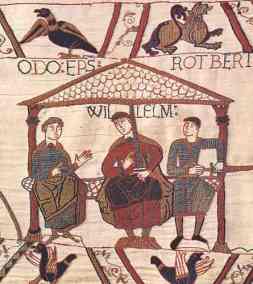Origins of English Words and Class!
Would you rather receive a hearty welcome or a cordial reception?
Notice the imagery and feelings evoked by the two phrases. The first has a Germanic origin, the second, French. The English language is split along class lines -- a reflection of the Norman invasion of England almost 1000 years ago. German-derived English words carry with them a working class connotation, and French-derived words come off sounding aristocratic and slightly repulsive.
Even though cordial literally means "of the heart" in French (cor is Latin for heart), the picture that comes to my mind is a royal douche-bag entering a hall of power amidst classical music and overdressed patrons and nobility. The image I get from hearty welcome is the extreme opposite: a single peasant reaching out to hug me and get me into their little hovel, out of the weather. Class is deeply embedded within our language, each word having its own unique history.
Wikipedia teaches many fun facts. The English language derives mainly from:
- Old German -- the Anglos and Saxons (from Saxony) conquered Britain in the 5th century, mixing with Scandinavians and developing Old English.
- Old French -- the Normans (from Normandy) conquered England in 1066.
William the Conqueror, first Norman king of England, is depicted above on the famous Bayeux Tapestry. His royal descendants would speak French until Henry V, 350 years later.
After the Norman invasion, England was dominated by a small French aristocracy, ruling over a much larger German working class. For more than three centuries, the rulers of England spoke French, while the common person spoke a Germanic language (Old English).
The two cultural groups began to intermarry after the Black Death of the 1340s wiped out half of the population, and over time the languages slowly merged, greatly simplifying the grammar of English, but also leaving a huge combined vocabulary.
The really interesting thing is that a lot of words in English carry a class connotation, based on whether they derive from French or from German. Words that mean basically the same thing will have either a formal, fancy, academic, upper-class connotation, or a casual, down-to-earth, gut-level, working-class feeling, depending on the origin of the word.
Check out this list of synonyms!
German-derived/ French-derived: begin/ commence; talk/speak; discuss/converse; ask /inquire or demand; teach/ educate; think/wonder; consider/ponder; understand/ comprehend; truth/ verity answer/ reply; before/ prior; come/ arrive; meet/find ; leave/depart; wall/ barrier; make/build construct; break/ destroy; small/little petite feeling/ sentiment; good beneficial/pleasant; hope/ aspire; lucky/ fortunate; help/ assist; mistake/ error; forgive/ pardon; buy/ purchase; have/own possess; yearly/ ;careful/wise prudent; child/youth; juvenile/adolescent; earth/ soil; cold/ frigid; wild/ savage; belly/gut abdomen; drink/ beverage; hungry/ famished; eat/ dine..
Notice that the Germanic words are usually shorter, more concrete and direct, while the French words are more elaborate, more abstract and indirect. What kind of person do you imagine speaking the words in the left column vs. the right column?
It's interesting to me that nature and children are described by the French-derived English words as somehow negative or hostile, as with savage and juvenile. To me this reflects the hatred on the part of the wealthy and powerful for that which is untamed and free.
The medical-industrial complex also uses almost exclusively Latin and French-derived words, to sound more technical. This has the effect of making the body seem lifeless and mechanical, as with abdomen.
Plus, meat words are almost all French-derived, which reflects that while the Anglo-Saxon working class was responsible for hunting/shepherding the animals, it was only the Norman nobility who could actually afford to eat meat.
(Note: You can view every article as one long page if you sign up as an Advocate Member, or higher).





